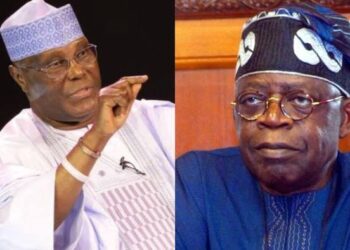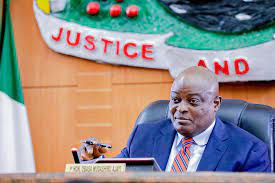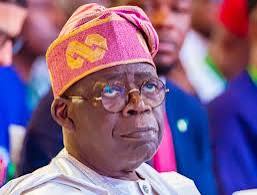EZREL TABIOWO examines last week’s intervention by the Senate on the identity card policy for northerners resident in Imo state
The Senate during plenary last Thursday lambasted the Governor of Imo state, Chief Rochas Okorocha, over the introduction of a policy by the state government making it mandatory for northerners to procure and carry identity cards for identification purposes, one intended to prevent insurgents from coming into the state.
The enraged senators who took their turns to condemn the governor’s action, also called for a reversal of the decision. This followed the consideration of a motion sponsored by the Deputy Senate Leader, Abdul Ningi (PDP Bauchi Central).
The Senate, amidst resolutions adopted on the floor sequel to consideration of the motion, called on President Goodluck Jonathan to direct security agencies not to partner with Imo state government in the implementation of the policy and also urged Okorocha to rescind same forthwith.
In the motion: “The Issuance of Identification Card to Northerners residing in Imo State – Urgent call for policy reversal”, Senator Ningi noted with serious concern, the recent government policy statement issued by the Imo state government , directing all northerners residing or staying in the state to be issued with an identification card.
He argued that the policy contravenes the provisions of section 41(1) and 42(1) of the 1999 constitution of the Federal Republic of Nigeria as amended which guarantees amongst others, free movement of Nigerians from any part of the country to the other and right of residence without any inhibition or condition whatsoever.
According to him, the policy if not reversed, would be tantamount to gross abuse of the citizens rights and if not checked, could throw the entire country into chaos and threaten the survival of the nation’s democracy.
The Senate Leader, Victor Ndoma Egba, (PDP Cross River Central), who spoke in support of the motion described the policy as wrongheaded, unconstitutional and discriminatory and lampooned the governor for ever contemplating such a policy at this level of our Nationhood.
He said: “Yes, right away, Nigeria is passing through the most difficult period of our history even worse that the civil war going by the kind of anxiety enveloping the country presently as a result of the Boko Haram insurgency. But that should not be used as a license by any governor or anybody to go out of our constitutional provisions in coming up with a policy to tackle the problem.
“This policy is discriminatory and unconstitutional and must be rejected from the onset by all concerned Nigerians .I condemn it in its entirety and urge all stakeholders coming up with any policy to address the security challenges facing the Nation , to tackle them within the confines of our constitution”.
In his contribution, a northern lawmaker, Senator Ahmed Lawan (APC, Yobe North) threatened a retaliation by the north if the policy is not reversed. He likened the development to the apartheid regime in South Africa of past years where the blacks were expected to carry cards in form of pass, to access white dominated areas.
“The policy is abominable, unacceptable and certainly driven to cause disunity in the country. We northerners will not accept this. If you do this to us in Imo, we shall definitely retaliate”, he threatened, making the Deputy Senate President , Ike EKweremadu to quickly interject by calling on the Senators to debate the motion as patriotic Nigerians and not as senators from southern or northern part of the country.
Other senators who spoke against the action were Helen Esuene, (PDP Akwa Ibom South), Smart Adeyemi (PDP Kogi West), Mohammed Tukur Bello (PDP Adamawa Central), Martin Nwaogwu (PDP Imo North), Olugbenga Kaka (APC Ogun East), Ita Enang (PDP Akwa Ibom North East).
But hell was let loose when the senator representing Imo East senatorial district, Chris Anyanwu rose to make her contribution on the motion. The lawmaker who trashed Okorocha said, “Today, the governor of Imo state has drawn an unusual attention to himself because he failed to respect the constitutional provision of free movement, free association, free worship which are well cherished by our people.
“Our people are the best travelled and most liberal minded in the world. We are highly accommodating, we are a people that are very friendly to the extent that we have a settlement for the Hausa people in Owerri who had been living there for generations.
“I have some of the Hausa children, most of whom are speaking better Igbo language, on my scholarship scheme while I have been sending some of their parents on hajj.
“However, someone, somewhere, who doesn’t respect the constitution of Nigeria, who doesn’t respect the law, who doesn’t believe in due process, and who doesn’t understand our people suddenly woke up one morning and introduced a policy that tends to create enmity between us and our beloved neighbours.
“We cannot plead on his behalf because we did not believe in his policy and he is a governor that doesn’t listen to the advice of his people.”
In his concluding remarks which came before putting the two prayers of the motion to vote, the deputy senate president who presided over plenary said, “Regrettably in this country, we have a strong sense of ethnicity profiling. We must find a way that only the guilt suffered for whatever offence committed and not innocent ones of his or her ethnic stock., Doing that I strongly believe, will better make Nigerians live peacefully with one another and more united.”
Reactions
Prior to the lawmakers’ angst, the APC South East chapter, had cautioned the governor over the alleged plan. Zonal spokesperson of the party, Osita Okechukwu, had described the idea as “unconstitutional and undemocratic”.
The APC however stressed that the introduction of the policy by the Imo state government would not only cause division among Nigerians, but also be the greatest disservice to the country that Boko Haram insurgents would benefit from.
The party, while emphasising that stability, unity and harmonious relationship of Nigerian citizens is paramount and fundamental to the development of the country, warned Okorocha that the introduction of such a measure on northerners may be reciprocated by northern states.
But in a sharp contrast, the Igbo socio-cultural group, Ohanaeze Ndi’gbo, backed the governor’s decision, arguing that the policy would curb the influx of insurgents into the state. National Publicity Secretary of the group, Chris Oganah, made the position known.
This certainly is another test for the nation’s federating system believed to be in operation. The question is: to what extent does a federal legislature play a role on states?
Observers are of the opinion that the intervention of the legislature in a purely executive matter may create a dangerous precedence which might be exploited in the future towards self-serving political gains.
Such observers posited that the federal government was in a better stead to intervene in the matter which has being unnecessarily politicised and given partisan colouration by some politicians beyond measure to whip up sentiments ahead of the 2015 elections.
End
QUOTE



